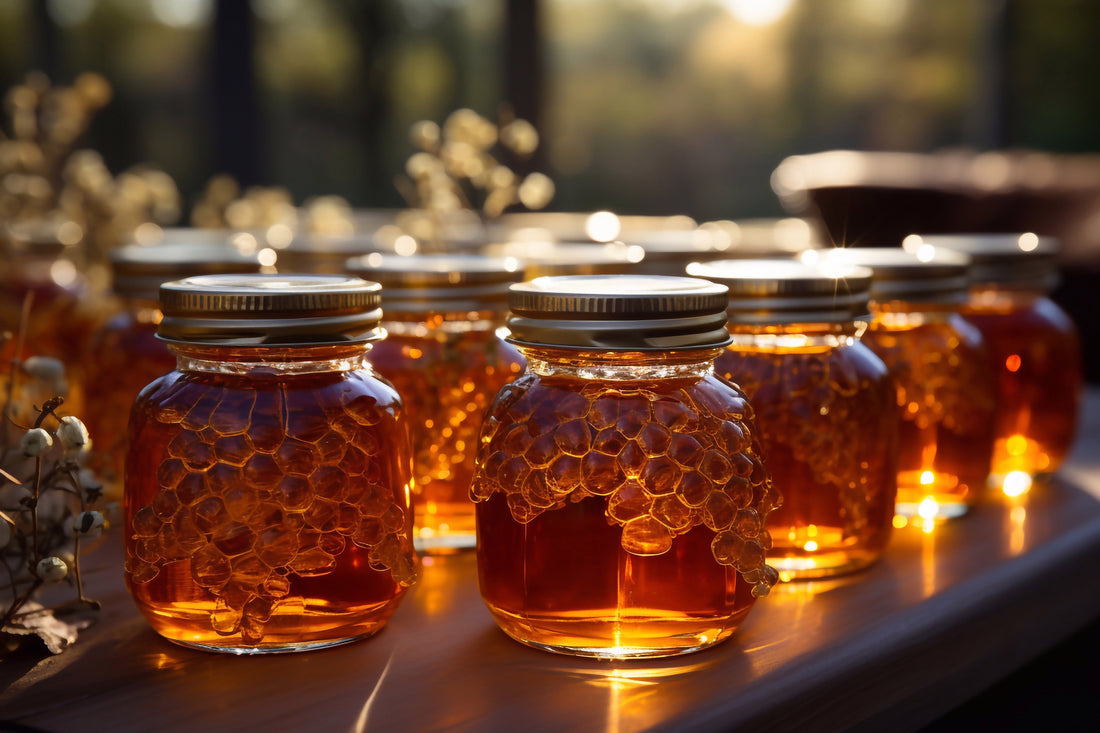
Honey in Skincare: Why It Works and How to Use It
Share
Honey in Skincare: A Natural Marvel for Radiant and Healthy Skin
Honey is a substance with a rich history that dates back to ancient civilizations, celebrated not only for its sweet, rich flavor but also for its numerous health benefits. In modern times, honey has become a go-to ingredient in the beauty and skincare industries, hailed for its ability to hydrate, heal, and soothe the skin. From its moisturizing properties to its healing potential, honey has proven itself to be a multifaceted skincare wonder. But how exactly does honey benefit the skin, and how is it harvested, processed, and refined to be used in skincare products? This blog will explore honey’s various skincare benefits, the process through which it is refined for use in beauty products, and why it remains a crucial ingredient in the formulation of effective skincare products.
The Science Behind Honey’s Skin Benefits
Honey is a product made by bees from the nectar of flowers. The complex composition of honey includes a variety of sugars, enzymes, amino acids, vitamins, and minerals, all of which contribute to its powerful properties. These include its ability to nourish the skin, combat bacteria, and provide anti-aging effects. Honey’s many benefits make it a valuable addition to any skincare routine. Below, we dive into why honey is considered a powerhouse ingredient in skincare.
1. Honey’s Humectant Properties
Honey is a natural humectant, which means that it has the ability to draw moisture from the air into the skin and retain that moisture. The sugars in honey bind water molecules, preventing the skin from becoming dry and dehydrated. By attracting and holding moisture within the skin, honey helps maintain a soft, smooth, and plump complexion. This makes honey a go-to ingredient in hydrating skincare formulations such as moisturizers, serums, and masks. The ability of honey to help the skin retain moisture makes it especially beneficial for individuals with dry or sensitive skin.
2. Antioxidant Powerhouse
Honey is rich in antioxidants, including flavonoids and phenolic compounds. Antioxidants play a vital role in protecting the skin from damage caused by free radicals—unstable molecules that can contribute to skin aging and the breakdown of collagen. Free radicals are generated by environmental factors such as UV radiation, pollution, and smoking. These factors can cause oxidative stress, which accelerates the aging process. By neutralizing free radicals, the antioxidants found in honey help slow down the visible signs of aging, such as fine lines, wrinkles, and sagging. Additionally, the antioxidants in honey can help repair damaged skin cells and protect the skin from future oxidative damage.
3. Antibacterial and Anti-inflammatory Effects
Honey has natural antibacterial and anti-inflammatory properties, which make it a powerful ally for those with acne-prone or sensitive skin. The antibacterial properties of honey are primarily attributed to the enzymes it contains, which produce hydrogen peroxide when applied to the skin. Hydrogen peroxide has natural antiseptic properties, helping to cleanse the skin and kill bacteria that may cause acne. In addition to its antibacterial effects, honey’s anti-inflammatory properties can help reduce redness, swelling, and irritation. These qualities make honey an excellent choice for soothing acne outbreaks, healing cuts and scrapes, and calming inflamed skin conditions like eczema and rosacea.
4. Skin Healing and Repair
Honey has been used for centuries in wound healing due to its natural healing properties. Its ability to speed up the skin's recovery process makes it a popular ingredient in skincare products designed to repair damaged skin. Honey helps to create a moist environment that promotes faster cell regeneration, which accelerates the healing of cuts, burns, and other skin injuries. The enzymes in honey also stimulate tissue regeneration, which can help reduce the appearance of scars. This makes honey an essential ingredient in skincare products intended for post-procedure recovery or to treat damaged skin.
5. Gentle Exfoliation
Honey contains natural enzymes that work as mild exfoliants. These enzymes help to break down dead skin cells, gently sloughing them away and revealing smoother, more radiant skin. Unlike harsher exfoliants, honey's enzymatic action is gentle on the skin, making it ideal for sensitive skin types. Regular exfoliation with honey can help to prevent clogged pores, blackheads, and dullness, while also improving the skin’s texture. The mild exfoliation provided by honey encourages skin cell turnover, which can give the skin a healthier and more youthful appearance.
Explore Skincare on AgelessBeauty3000.com
6. Skin Brightening and Even Tone
Honey is known to have natural brightening effects on the skin. The enzymes present in honey help to loosen dead skin cells, revealing fresher and brighter skin underneath. Honey also promotes an even skin tone by reducing the appearance of dark spots and hyperpigmentation. This makes honey an ideal ingredient for individuals dealing with uneven skin tone, sun spots, or discoloration. Regular use of honey-based skincare products can help achieve a glowing, luminous complexion.
How Honey is Harvested and Processed for Skincare Products
The process of harvesting honey and refining it for use in skincare products is a delicate one. It requires care and precision to ensure that honey retains its beneficial properties, such as its antibacterial, antioxidant, and moisturizing effects. Below is an overview of how honey is collected, purified, and processed for incorporation into skincare formulations.
1. Honey Harvesting: A Sustainable Process
Honey is produced by bees as they collect nectar from flowers. The bees store the nectar in their hives, where they use enzymes to break down the sugars and transform the nectar into honey. The beekeeper’s role is to safely collect the honey from the beehive. The process of harvesting honey involves removing the honeycomb from the hive, uncapping it, and extracting the honey.
Beekeepers must ensure that the honey is harvested in an ethical and sustainable manner, taking care not to harm the bees. Ethical beekeepers typically leave enough honey behind in the hive to ensure that the bees have enough food to survive the winter. The harvested honey is then strained to remove any impurities such as wax, debris, and pollen.
2. Purification and Filtration
Once honey is harvested, it undergoes a process of purification to remove any unwanted particles, such as beeswax, pollen, or other debris that may have been inadvertently collected during the harvesting process. Honey is often filtered through fine mesh to ensure that it is free from solid particles. This filtration process is essential for producing honey that is smooth and clean, which is important when it is used in skincare formulations.
3. Refining Honey for Skincare Use
After the initial filtration, honey may undergo additional processing steps to create honey extracts or derivatives. Honey extract is typically more concentrated than raw honey and is created by diluting honey with water or other solvents. These extracts are easier to incorporate into skincare formulations because they have a more controlled consistency and concentration of active ingredients.
Honey may also be refined further through methods like cold-pressing or high-pressure processing, which preserve the natural enzymes and active compounds found in honey. The goal is to maintain the beneficial properties of honey while ensuring that it can be effectively used in a variety of skincare formulations, such as creams, serums, cleansers, and masks.
4. Honey in Skincare Formulations
Once honey is refined into an extract or derivative, it is added to skincare products as a key ingredient. Honey’s versatility makes it suitable for a wide range of products, from moisturizers and cleansers to masks, serums, and spot treatments. The concentration of honey in skincare products varies, depending on the product’s intended purpose and the skin concerns it aims to address.
Why Honey is Chosen for Skincare Products
Honey is a highly prized ingredient in skincare because of its natural composition and the range of benefits it offers. Below are some reasons why honey is often chosen for skincare products:
1. Natural and Gentle
One of the most significant advantages of honey in skincare is that it is a natural ingredient. Many people prefer natural skincare products because they are often free from synthetic chemicals, fragrances, and additives that can irritate the skin. Honey is gentle and suitable for all skin types, including sensitive skin. Its anti-inflammatory properties also make it ideal for soothing irritated skin and reducing redness.
2. Multi-functional Benefits
Honey offers a variety of skin benefits, which makes it a highly versatile ingredient in skincare. Whether you are looking to hydrate dry skin, fight acne, reduce signs of aging, or promote skin healing, honey has something to offer. This ability to address multiple skin concerns in one product makes honey a valuable addition to any skincare routine.
3. Proven Track Record
Honey has been used for centuries in various cultures for its medicinal and healing properties. Its use in skincare is backed by both tradition and modern science. Research continues to confirm the effectiveness of honey in treating a wide range of skin conditions, from dryness and acne to scars and sunburns. The proven track record of honey in skincare makes it a trusted ingredient for both consumers and skincare formulators.
4. Non-comedogenic
Honey is considered non-comedogenic, meaning that it does not clog pores. This makes it suitable for individuals with acne-prone skin. Its ability to regulate moisture without causing excess oil production helps keep the skin balanced and clear.
The Future of Honey in Skincare
As consumers become more conscious of the ingredients in their skincare products, honey’s popularity in beauty and skincare is likely to continue to grow. The demand for natural and sustainable skincare products is on the rise, and honey checks all the boxes as a safe, effective, and eco-friendly ingredient. Honey's versatility makes it an excellent candidate for incorporation into new formulations designed to address a variety of skin concerns.
The future of honey in skincare looks promising as new research continues to uncover its many benefits. Honey may become even more widely used in advanced skincare formulations, from anti-aging products to those targeting specific skin conditions. The beauty industry is likely to continue exploring innovative ways to harness honey’s healing and restorative properties, allowing consumers to enjoy the full spectrum of benefits that this natural ingredient has to offer.
Conclusion
Honey is much more than a sweet treat for your tea or toast. It is a skincare powerhouse, offering a wide array of benefits for the skin. Its ability to hydrate, heal, and protect the skin, along with its antioxidant and antibacterial properties, make it an essential ingredient in many skincare products. The process by which honey is harvested, purified, and refined ensures that its natural benefits are preserved and delivered effectively in skincare formulations. With its natural, gentle, and multi-functional properties, honey remains a staple in the beauty industry, trusted for its ability to improve the health and appearance of the skin. Whether you’re looking for hydration, healing, or anti-aging effects, honey has a place in your skincare routine.
Explore Skincare on AgelessBeauty3000.com
